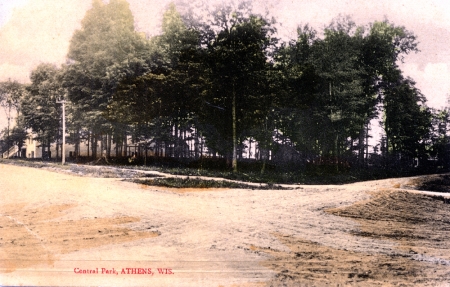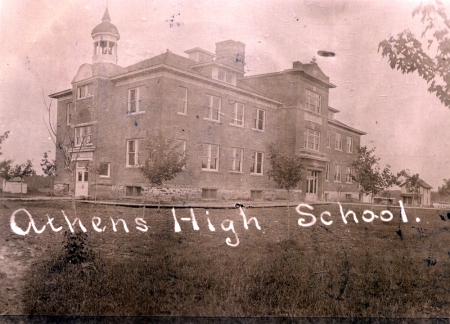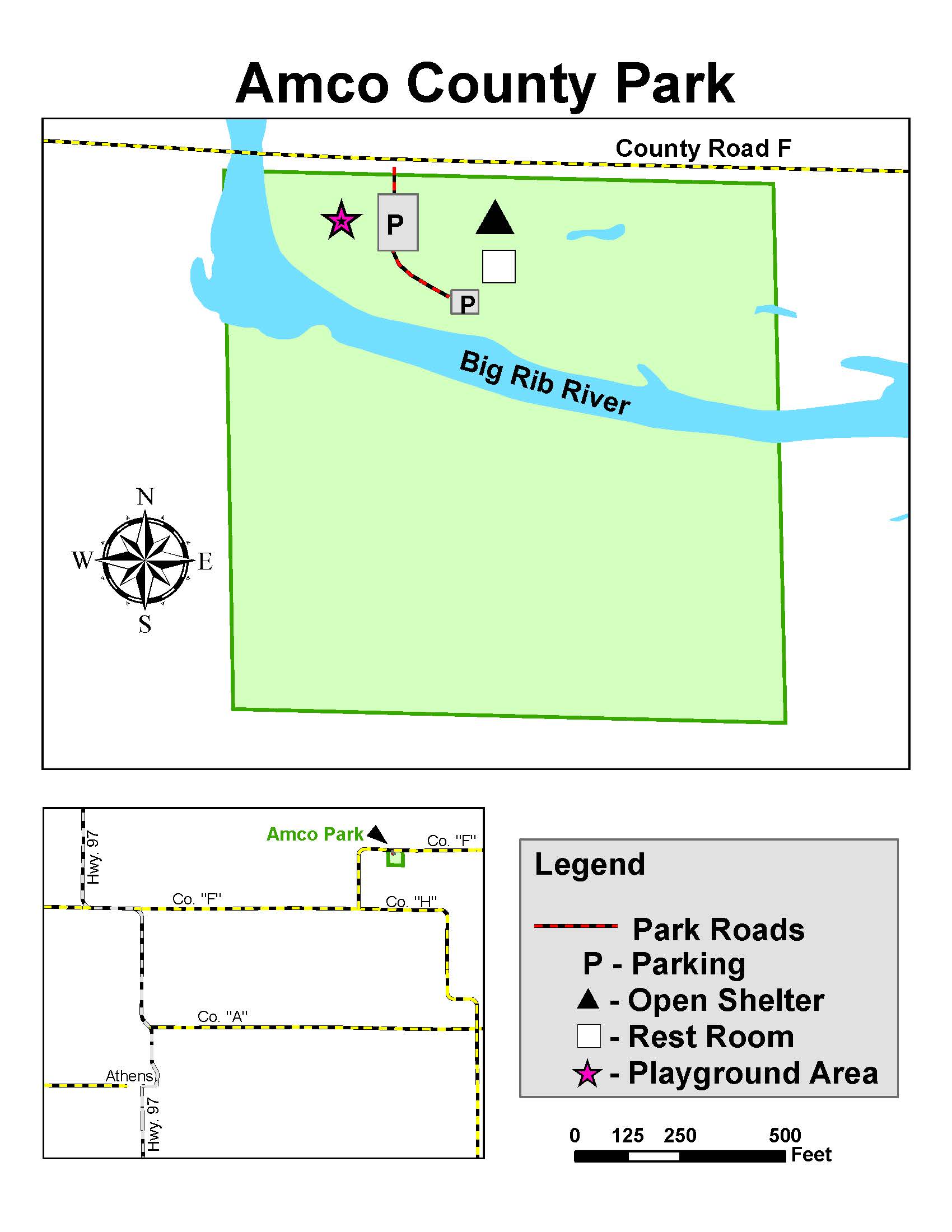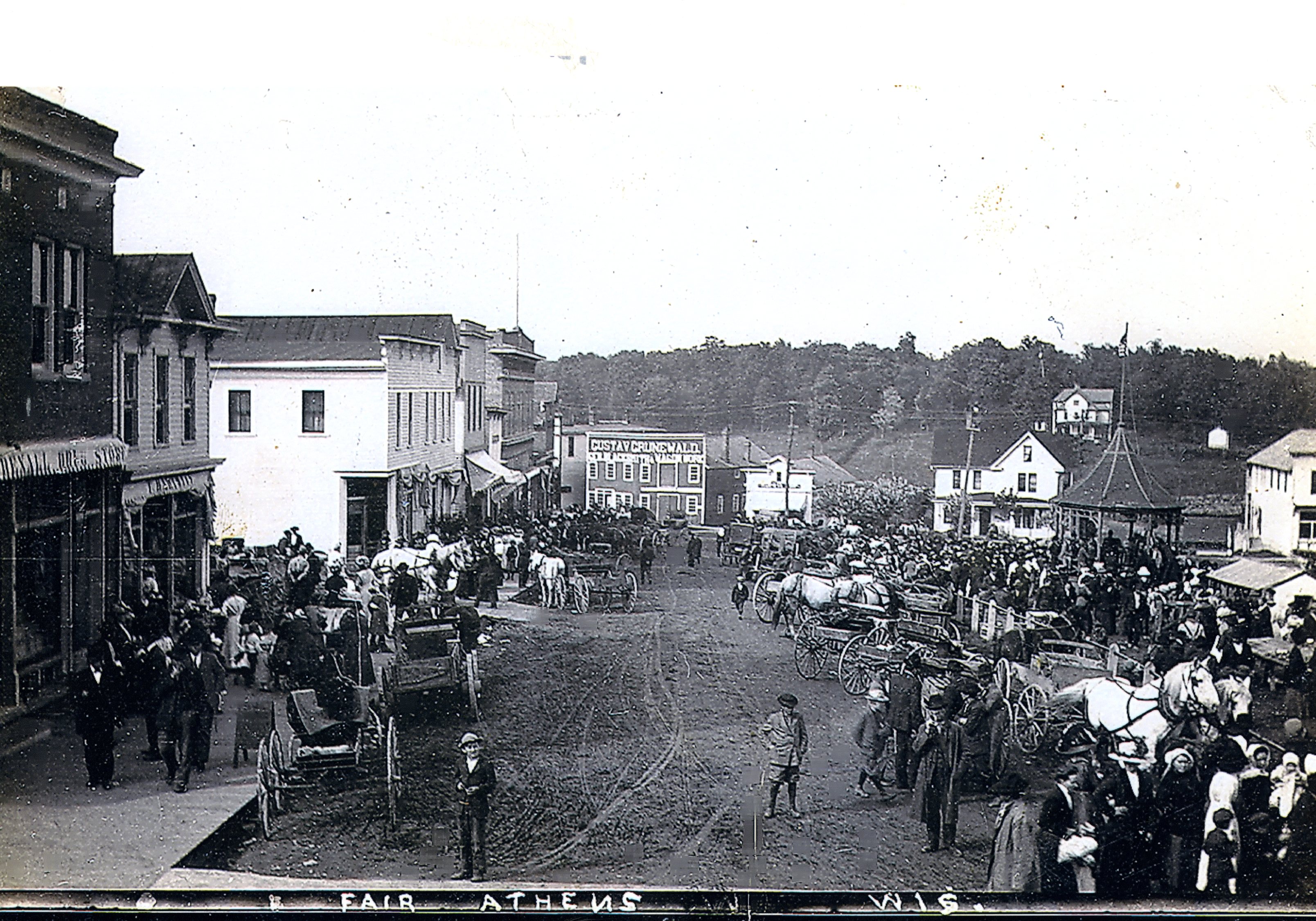Search our Places Database
Athens, Village of
Return To List of Locations | Back to Search
For more information on this location, please contact our research library.
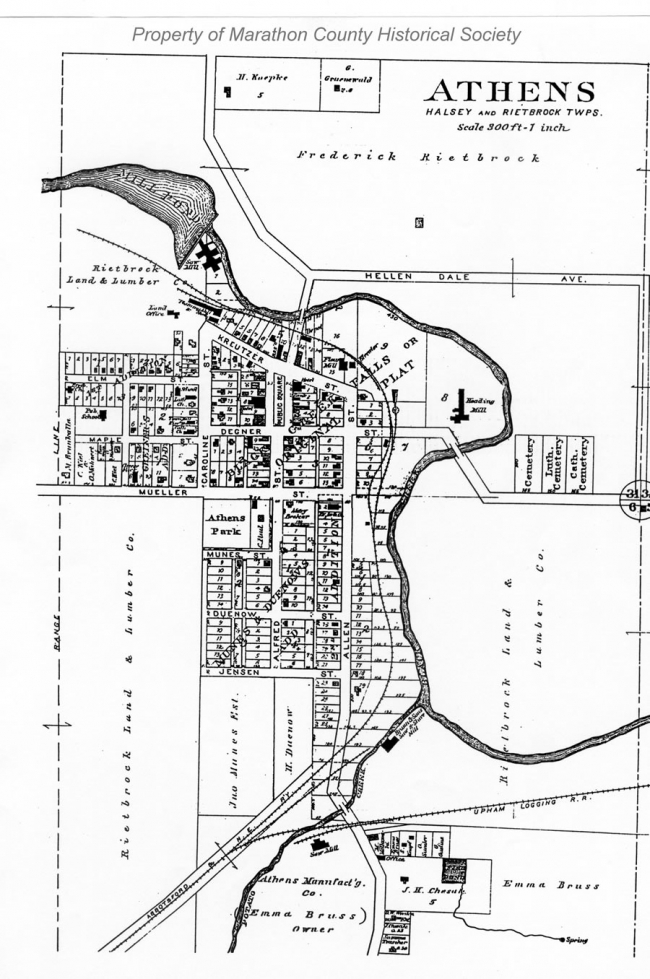
Author:
Mary Moltzan
Location:
T. 30 N. - R. 3 E., Sec. 36; T. 30 N.- R. 4 E., Sec.31; T. 29 N. - R.4 E., Sec. 6; and T. 29 N. - R. 3 E., Sec. 1, Townships of Bern, Halsey, Johnson and Rietbrock
Founded:
1870s
Formallized:
1890
Background:
Population: 1905-862, 2000-1095.
The founder of Athens, Fred Rietbrock, bought many acres in his firm's name in the late 1870's. In 1879, he cut a road from Dorchester in Clark County to his settlement, then called Black Creek Falls. First settlers to the area were Henry Degner, Andrew Kreutzer, and William Rietz, who came Nov. 5, 1880. Fred Rietbrock built a saw and planing mill as a place of employment for the settlers moving to the area until their farms could support them. Settlers to the area came mainly from Germany and Switzerland. Rietbrock, Halsey and Johnson began selling village lots in the early 1880s. Rietbrock even built housing that newcomers could occupy until they could clear a small area on their own. In 1900, the village was renamed Athens.
The name "Athens" was picked because like Athens, Greece, it is built on a hill. The village citizens pictured the city as a center of culture and learning.
See Railroad
First Public Official:
Henry Kreutzer (1865-1918)
Biography:
Henry Kreutzer was born in the Town of Mequon in Ozaukee County in 1865. He attended public school and helped on the family farm until he was 22 years old. For the next five years, he worked as a clerk in an Athen's store and then opened his own hardware store. Two years later he added a stock of furniture. He served as village president and held other local offices. He was a member of the Masonic Lodge in Medford and of the M.W.A., the F.O.E., and beavers, all in Athens. In 1888, he married Nellie Worden.
Post Office Established:
April 5, 1882
First Postmaster:
Louis D. Klein
About The Post Office:
Originally called Black Creek Falls, the name was changed to Athens, January 16, 1890. The P.O. located in Section 31 of Halsey Twp. is still in service.
Railroad:
Rietbrock went to the railroad companies and asked them to build a railroad from Abbotsford to Black Creek Falls. They refused, so he formed the Abbotsford and Northeastern Railroad Company and subsequently built a railroad from Abbotsford to Athens, completing it in 1889. After this, the population increased, and the town developed more rapidly. Rietbrock's railroad served the settlers for many, many years.
Churches:
1. Trinity Lutheran Church was organized in 1882. The first church building was built in 1886.
2. A Catholic mission church was organized in 1881. In 1886, the Holy Redeemer Church was built in Section 36. In 1904 work was begun on a new church in a different location in Athens in Section 6 of Rietbrock Township. This German Gothic-styled church was dedicated in 1906 and named St. Anthony's Catholic Church.
3. Christ United Church - The first church building was dedicated in 1898.
4. First Presbyterian Church - The first church building was built c1901.
5. The Emanuel Evangelical Methodist Church was organized in 1900. The church was built in 1904 on land donated by Fred Rietbrock on Mueller Street.
Schools:
1. Black Creek Falls had a school as early as the fall of 1883.
2. Athens High School opened in 1906.
3. Trinity Lutheran School was established in 1901.
4. Catholic School- In 1901, the congregation acquired two old public school buildings, moved them to the first parish site, and combined them into one building. In 1907, a new school was built on the new site of St. Anthony's.
Business:
Examples 1. Degner Hardware Store; 2. Athens House and other hotels; 3. Athens Record newspaper; 4. Opera House; 5. Brumm's Tavern; 6. Hartman Store; 7. Grunewald Blacksmithing and Woodworking; 8. Kiehl Meat Market.
In October of 1880, Louis Kline came and built the first private home and opened a store and saloon.
Fred Schultz, an emigrant who came directly from Germany in 1881, built a house which later became the Central Hotel.
John Bell (from England) opened the first blacksmith shop.
Industry:
Sawmills, heading and stave factory, Cant-hook factory, flour mill and cheese factories.
Farming:
Fred Rietbrock thought the area land was adaptable to agriculture and encouraged pioneers to settle in the area. The Rietbrock Company built houses and roads at company expense and offered employment in its logging operations. Andrew Kreutzer settled the first farm near Black Creek Falls. Fred Rietbrock also built and operated a model farm, called Helendale, employing the newest equipment and farming inovations.
Hay grew plentifully and was sold to the lumber camps which often had 60-70 oxen to feed and bed. By 1898, there were enough dairy farms to keep cheese factories open through the winter. Potatoes were raised among tree stumps and some wheat was also grown. While farmers raised cattle, there were few pastures and cows ran loose through the woods in the early days. Some beef cattle, and later hogs, were raised and butchered by the farmers to provide beef, pork, and lard.
Stories:
The horse and buggy days were not without traffic accidents. One day John Kreutzer hitched a new horse to a buggy to give him exercise. John drove, along with his two nieces, Louise Kreutzer and Caroline Degner. John stepped from the buggy to adjust the harness and the horse bolted. John held on as long as he could, but had to let go. Down the road a ways at the Athen's House hotel, the two girls were thrown from the buggy but caught by bystanders without being seriously hurt. The horse ran down the road headed for Dorchester. After going seven miles, the rig was stopped by a farmer named Brown. Neither the horse nor the buggy were injured which was remarkable considering the speed and the condition of the roads in those days.
Another story tells of how Potato Creek, just south of the village, got its name. While there was still no bridge across the creek, Mrs. Rietbrock, wife of the founder, wishing to do her part in helping the area, accompanied her husband from Dorchester. She carried a pail of potatoes which she wished to plant at Helendale farm. In crossing the creek, she slipped and fell, spilling the potatoes. Since then the creek has been called "Potato Creek".


